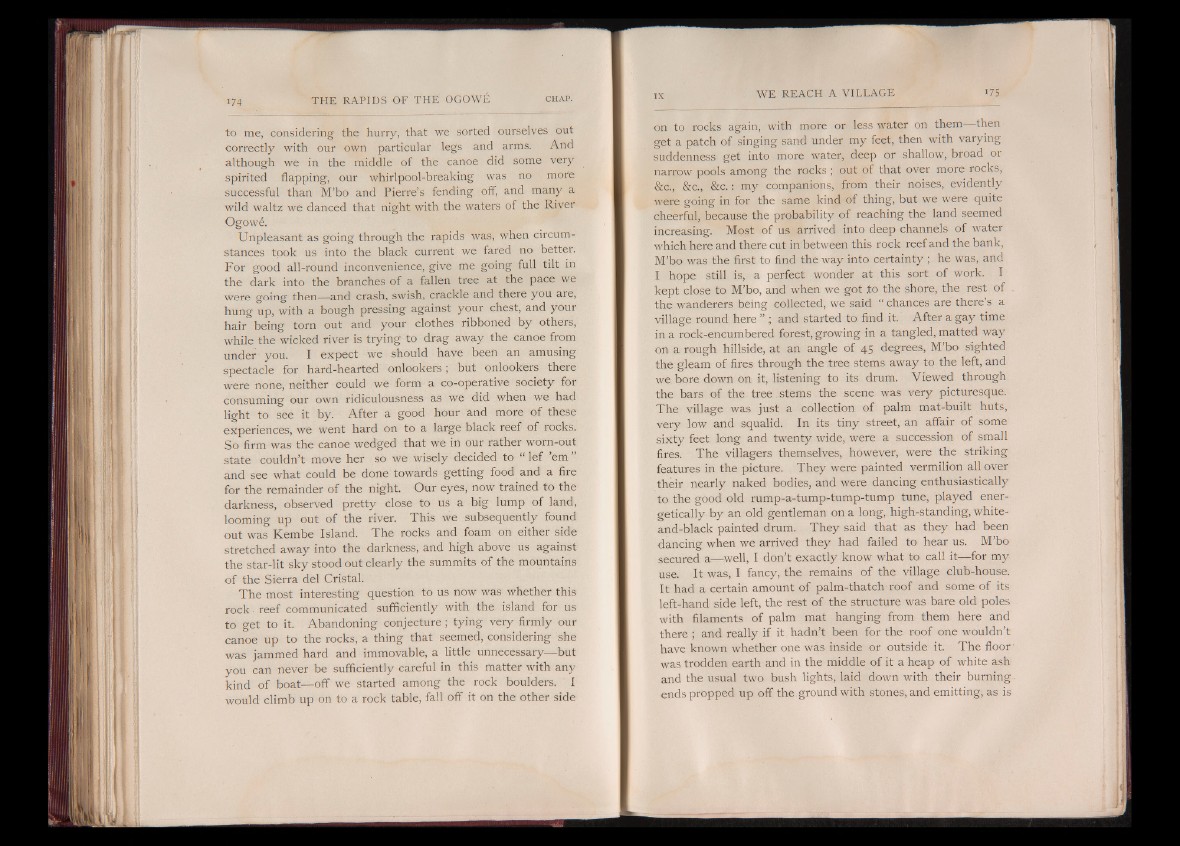
to me, considering the hurry, that we sorted ourselves out
correctly with our own particular legs and arms. And
although we in the middle of the canoe did some very
spirited flapping, our whirlpool-breaking was no more
successful than M’bo and Pierre’s fending off, and many a
wild waltz we danced that night with the waters of the River
OgowA
Unpleasant as going through the rapids was, when circumstances
took us into the black current we fared no better.
For good all-round inconvenience, give me going full tilt in
the dark into the branches of a fallen tree at. the pace we
were going then— and crash, swish, crackle and there you are,
hung up, with a bough pressing against your chest, and your
hair being torn out and your clothes ribboned by others,
while the wicked river is trying to drag away the canoe from
under you. I expect we should have been an amusing
spectacle for hard-hearted onlookers; but onlookers there
were none, neither could we form a co-operative society for
consuming our own ridiculousness as we did when we had
light to see it by. After a good hour and more of these
experiences, we went hard on to a large black reef of rocks.
So firm was the canoe wedged that we in our rather worn-out
state couldn’t move her so we wisely decided to “ lef ’em ”
and see what could be done towards getting food and a fire
for the remainder of the night. Our eyes, now trained to the
darkness, observed pretty close to us a big lump of land,
looming up out of the river. This we subsequently found
out was Kembe Island. The rocks and foam on either side
stretched away into the darkness, and high above us against
the star-lit sky stood out clearly the summits of the mountains
o f the Sierra del Cristal.
The most interesting question to us now was whether this
rock ■ reef communicated sufficiently with the island for us
to get to it. Abandoning conjecture; tying very firmly our
canoe up to the rocks, a thing that seemed, considering she
was jammed hard and immovable, a little unnecessary— but
you can never be sufficiently careful in this matter with any
kind of boat— off we started among the rock boulders. I
would climb up on to a rock table, fall off it on the other side
IX WE REACH A VIL LAGE *75
on to rocks again, with more or less water on them— then
get a patch of singing sand under my feet, then with varying
suddenness get into more water, deep or shallow, broad or
narrow pools among the rocks ; out of that over more rocks,
&c., &c., & c .: my companions, from their noises, evidently
were going in for the same kind of thing, but we were quite
cheerful, because the probability of reaching the land seemed
increasing. Most of us arrived into deep channels of water
which here and there cut in between this rock reef and the bank,
M’bo was the first to find the way into certainty ; he was, and
I hope still is, a perfect wonder at this sort of work. I
kept close to M’bo, and when we got .to the shore, the rest of
the wanderers being collected, we said “ chances are there’s a
village round here ” and started to find it. After a gay time
in a rock-encumbered forest, growing in a tangled, matted way
on a rough hillside, at an angle of 45 degrees, M’bo sighted
the gleam of fires through the tree stems away to the left, and
we bore down on it, listening to its drum. Viewed through
the bars of the tree. stems the scene was very picturesque.
The village was just a collection of palm mat-built huts,
very low and squalid. In its tiny street, an affair of some
sixty feet long and twenty wide, were a succession of small
fires. The villagers themselves, however, were the striking
features in the picture. They were painted vermilion all over
their nearly naked bodies, and were dancing enthusiastically
to the good old rump-a-tump-tump-tump tune, played energetically
by an old gentleman on a long, high-standing, white-
and-black painted drum. They said that as they had been
dancing when we arrived they had failed to hear us. M’bo
secured a— well, I don’t exactly know what to call it— for my
use. It was, I fancy, the remains of the village club-house.
It had a certain amount of palm-thatch roof and some of its
left-hand side left, the rest of the structure was bare old poles
with filaments of palm mat hanging from them here and
there ; and really if it hadn’t been for the roof one wouldn’t
have known whether one was inside or outside it. The floor
was trodden earth and in the middle of it a heap of white ash
and the usual two bush lights, laid down with their burning
ends propped up off the ground with stones, and emitting, as is